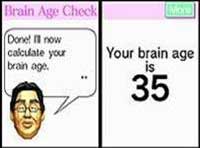An increasing number of Japanese people are being drawn into the brain training movement, with bookstores even setting up dedicated sections for brain exercises and video games.
 |
|
Brain training games are becoming very popular in Japan |
These brain training tools are currently in high demand, especially among elderly Japanese who are enthusiastic about exercises. They hope these light-hearted games will help them regain their youthful vigor.
Many individuals feel that their “brains are deteriorating,” experiencing sluggish reactions and forgetfulness unlike before. Some even worry that their brains may be suffering from some illness.
However, experts indicate that biologically, there is nothing wrong with their brains; it’s just that repetitive tasks have made their brains less active over time.
Especially in today’s high-tech era, with computers and mobile phones permeating every corner of life, people have become overly reliant on them, leading to a “laziness” in brain activity.
The invention of these games aims to encourage more brain activity, making it more flexible and responsive again.
The person who invented this sports game is a professor of neuroscience at Northeastern University in Japan, and his theories have since been widely disseminated through media outlets.
Among the best-selling books introducing these games are “Brain Training Puzzles,” “Brain Training Reading Book,” and “Word Guessing Brain Games.”
Since May 2005, Nintendō Corporation began releasing “Brain Training Games for Adults,” and by December, it had sold 3.3 million copies, leading to a surge in sales of the handheld DS consoles used to play them.
The company reports that one-third of the customers purchasing these games are under 35 years old. “We are targeting an audience that does not typically enjoy video games, but we did not anticipate such success. We have created a phenomenon.”
Meanwhile, Sony, a competitor of Nintendō, is targeting the elderly demographic. They have established a “Video Game Workshop for Seniors” to focus on this area.
Sony’s games score players, while Nintendō’s games “score the brain age” of players on a scale from 20 to 80 years.
If the game indicates your brain age is 20, you will likely feel very pleased; however, if it reports your brain age is 80, you will need to play more to rejuvenate your brain!
Phuong Lan


















































